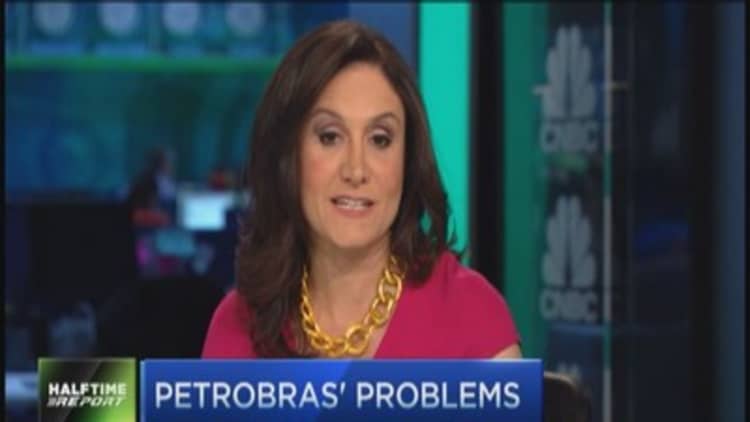Shares of Petrobras stabilized Wednesday for the first time in months—they've fallen 45 percent since August. And as shareholders take a breather to digest the scandals hitting the company, investors are sizing up short-term threats.
Morgan Stanley rates Brazil's state-run oil company at "equal-weight"—the firm's equivalent of a "hold"—but is no longer willing to put a price target on the shares due to uncertainty about a criminal investigation into possible bribery and allegations about money laundering.
The alleged scam involved contracts that were larger and more costly than necessary so that executives and politicians could skim money off the top. A judge in Brazil on Wednesday released 11 of the 24 people arrested in the corruption scandal pending a trial in the cases.
Read MoreEnergy in 25 years: Who's producing, who's buying
On Friday, Petrobras acknowledged that the still unfolding government investigation makes it impossible for the company to pin down a date for when it will deliver independently audited third-quarter results. It expects to release results "without a review" by independent auditors on Dec. 12.
The immediate threat to investors now, according to Morgan Stanley, is an asset write-off.
Petrobras may be carrying assets at higher values than they deserve because they were inflated beyond their real value for the purposes of fraud.
Read MoreISIS in trouble: What could this mean for oil?
Morgan Stanley did an analysis in which the firm calculated anywhere from a 1 percent write-down of assets, to what they think will be a worst case scenario of a 5 percent write-down of assets.
The spread matters, because if Petrobras were to write off only 1 percent, then net income for 2014 would be lowered by 19 percent, according to Morgan Stanley. If the write-off were to reach 5 percent, then net income for 2014 would be lowered by an eye-watering 95 percent.

The other big risk would be if Petrobras found itself unable to borrow money early next year. Historically, the company borrows a lot of money every year. In 2007, its debt totaled almost $22 billion. This year, it stands at almost $140 billion. Drilling far offshore and in very deep water is extremely expensive.
If Petrobras can't borrow, it could try to survive on cash flow or get some kind of state-sponsored help. The government is the firm's majority owner after all.
If that doesn't happen, Petrobras could issue new equity. Giving out more ownership of the company to new shareholders would severely dilute current shareholders. Morgan Stanley estimates dilution of anywhere from $1.23 per American Depositary Receipt, to as much as $1.48 per ADR. It's trading at about $9.42 on Wednesday.
The debt side of the equation
Then there's the company's debt. Petrobras carries $130 billion of it.
Jim Grant, a famed fixed-income investor and author of Grant's Interest Rate Observer, said "Don't touch it."
He pointed out that Petrobras is the most-leveraged of the "state-controlled and/or despot-tainted" energy companies in the world. Petrobras' ratio of debt to earnings before interest, taxes, depreciation and amortization (EBITDA) stands at 5.3 to 1.
Read More Cracks widen at OPEC as oil prices tumble
Pemex, in Mexico, has a comparable ratio of only 1.1 to 1. Rosneft in Russia is 1.8 to 1, and Gazprom in Russia is only 0.95 to 1.
Grant said that current yields are far below what an investor should accept for bearing an enormous amount of risk. Still, it's clear that there are willing owners in the market, because some of the bonds yield as little as 1.92 percent for a bond due in February that was originally issued at 2.875 percent. That suggests that not everyone is running for the exits yet.


